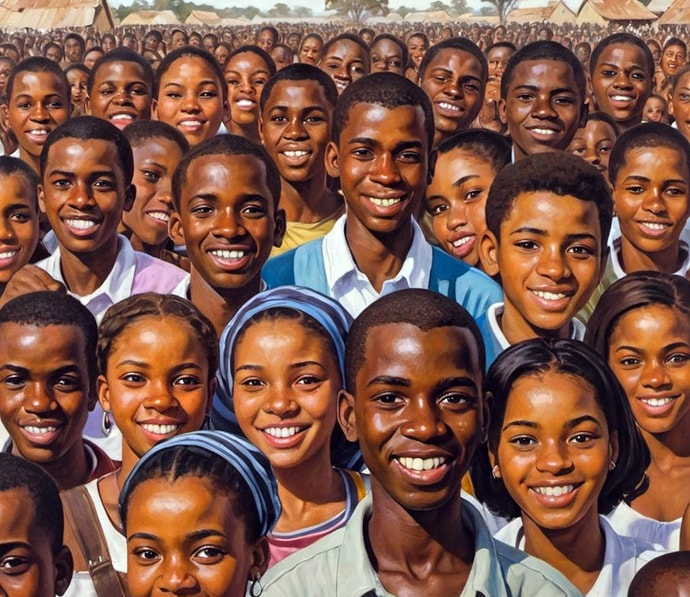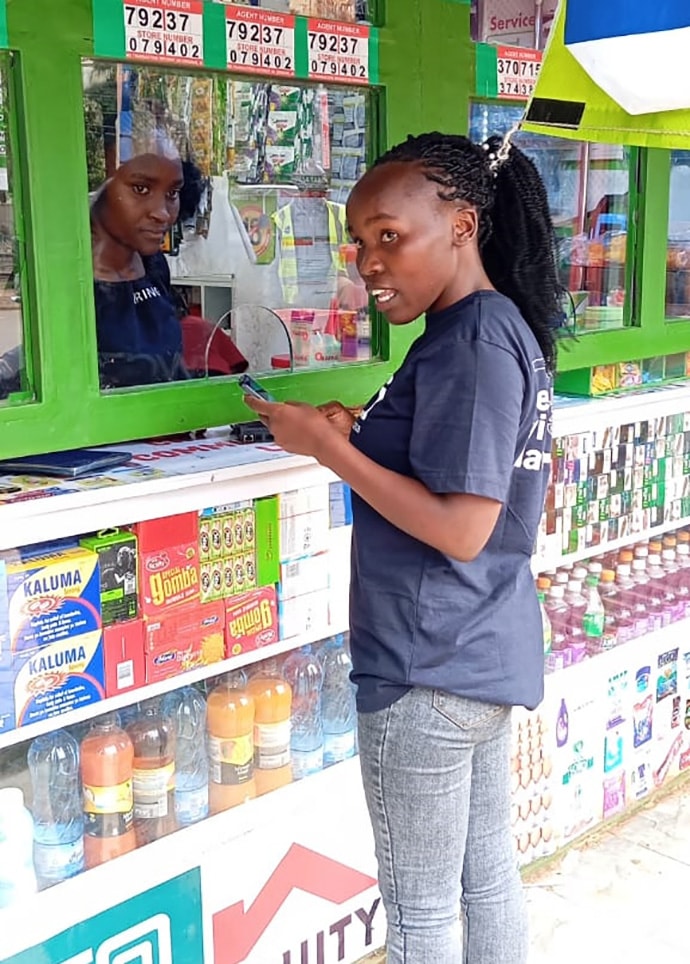By Tracey Compton, Senior Media and Communications Coordinator

Image created by GlobalWA with OpenArt.ai
The coming “youthquake” in Africa is well-documented. Reports indicate Africa will account for two out of every five children born on the planet. According to The New York Times analysis of UN World Population Prospects, Africa will have the world’s largest workforce, surpassing China and India within the next decade – yet there remains a lagging focus on job creation on the continent. Historically, employment programming has focused on job skills training or seed money to start businesses. But what can you do when there aren’t enough jobs for the growing population and training more people only creates a larger pool of higher-skilled unemployed people?
At Mercy Corps, we believe that ‘jobtech’ platforms will play a critical role in the future of work in Africa. Jobtech describes the digital platforms that more effectively and efficiently match people with the kind of work that builds livelihoods, using technology to enable, facilitate, or improve access and delivery of quality work. In the US, it’s difficult to find a job or gig, or sell a product, without in some way interacting with an e-commerce platform, job board, or matching platform. These platforms have improved access to job opportunities across the country, reduced barriers to access for excluded groups like refugees. By some estimates, there are more than 26 million ecommerce micro-enterprises in the US.
In Africa, jobtech is currently far from ubiquitous; there are few successful platforms, and few young people successfully building their livelihoods through jobtech. But with rapid growth in digitization (the number of smartphone subscriptions in Africa has grown from less than 20 million in 2011 to over 400 million in 2023) and demographic shifts, this sector is primed for growth. It is expected that 30-88 million Africans will earn at least a portion of their income through jobtech by 2030.
The Jobtech Alliance, an ecosystem-building initiative steered by Mercy Corps and BFA global, seeks to ensure that unemployed and underemployed young people across the continent can find quality work through digital platforms.

The Jobtech Alliance works with high-potential job tech platforms across Africa to improve their businesses in ways that:
- Create more jobs for their users.
- Improve the quality of work for existing users.
- Reduce barriers to access for marginalized groups like refugees.
The Jobtech Alliance also shares the learnings of what does and doesn’t work with its community of over 1,500 entrepreneurs building Jobtech platforms in Africa and other stakeholders.
Since launching in 2021, the Alliance has created and improved 1,800 quality jobs and brought income to 11,000 people across over 20 jobtech platforms. The Alliance’s next phase, which is set to begin in 2025, aims to create income opportunities for more than 500,000 young people across Africa.
Interestingly, while only 42% of platform users overall were female, 58% of the platforms’ higher earners were female, which shows that – when given the chance – young women in Africa outperform men on these platforms. Additionally, the Jobtech Alliance has more than 40,000 unique consumers of its learning content.
How Jobtech Alliance is creating new jobs
Joyce, 27, of Nairobi, Kenya’s Kasarani neighborhood, found work through a platform called Rwazi. Rwazi is one of the platforms in the Jobtech Alliance. After applying for more than 500 jobs and spending more than six months without work after graduation, she was hired as a ‘mapper’, collecting data for different clients. Joyce needed additional income to pay for her growing family. “As much as food is the basic need, you have diapers to buy, clothes for the baby…And you need something to send home to your family,” she said.
“[At first] I was paranoid about doing it because I had tried so many apps,” Joyce explained. She was surprised and pleased when she received her first payout after a short time. Because Joyce has done so well on the platform, she gets access to bigger gigs/accounts from these clients.
“The last project that was approved is for 200 shops – I’ve already done 88,” she explained with a smile.

Joyce using Rwazi in Nairobi. Photo: Mercy Corps
Felix, 25, originally from Kisii, Kenya, now living in Nairobi, also found success through Rwazi. He moved to Nairobi seven years ago to study IT and was looking for work he could do while balancing his studies. He found work as a part-time ‘mapper’ collecting data for different clients. He receives gigs/requests on his phone, for example, finding which products are selling at different microenterprises or ‘dukas’ in Nairobi. Felix is paid for each shop he visits.
“People go for internships for their career. But people look for gigs to get money to sustain themselves,” he said.
In both cases, the Jobtech Alliance works with Rwazi to improve its commercial strategy, enabling it to find more clients, which in turn creates more jobs for its users. This ensures that Rwazi can offer quality income to users despite the gig-based nature of the work. This has also helped Rwazi maintain a 91% satisfaction rate amongst its mappers, 89% of whom are youth and 59% of whom are female.
The Jobtech Alliance has learned just how hard it is to build effective jobtech platforms on the continent. Imagine a platform that matches plumbers to gigs. TaskRabbit or Thumbtack in the US works within a broadly functioning labor market – skilled and accredited plumbers travel to clients, buy quality materials, and maintain customer relationships. The equivalent platform in most of Africa has to manage a plethora of challenges: low levels of vocational training and lack of functionally usable accreditation; a lack of tools and equipment; minimal working capital and few financing options; a broken supply chain of quality materials; unreliable and expensive public transport to get to gigs; soft skills and communication gaps between workers and service buyers; weak trust in platforms and high levels of platform disintermediation (plumbers and buyers go off-platform after an initial match). But while these challenges make it difficult to build such platforms in Africa, it also demonstrates the huge impact that they can have on labor markets and employment. Despite the challenges, there is great potential in this sector for the continent.